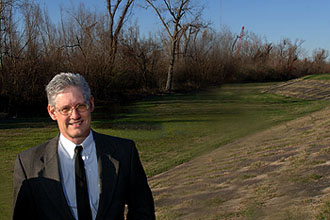Moment of Truth
While the explosion of the Deepwater Horizon oil rig killing 11 workers and spewing millions of gallons of oil into the Gulf of Mexico is a human, environmental and economic tragedy, it also constitutes a “moment of truth” in the decades-long effort to develop effective policies for conserving and restoring coastal areas, says Mark Davis, director of the Tulane Institute of Water Resources Law and Policy.

Mark Davis advocates “clear-eyed” pragmatism for future oil development in the Gulf. He is director of the Tulane Institute of Water Resources Law and Policy. (Photo by Paula Burch-Celentano)
Since the late 1980s, federal and state officials, with input from scientists and engineers, have gradually developed plans for coastal restoration and hurricane protection. Davis says that any efforts to remediate damage from the oil spill should “dovetail with the broader plans that have been on the drawing boards for so long.”
Those broader plans to restore coastal wetlands comprise projects diverting freshwater and sediment from the Mississippi River, restoring barrier islands and stabilizing naturally occurring ridges and shorelines.
In the weeks and months after the blowout, Davis says his institute at the Tulane Law School has advocated that, in the midst of this crisis, state and federal officials not lose sight of the larger picture.
“Our view is you don't need a brand-new plan. What you need is a brand-new commitment and to work within the frameworks that we've already begun to create.”
Such a holistic view necessarily avoids polemics. “This isn't a matter of nature good, oil bad,” says Davis, who acknowledges that oil exploration in the Gulf will not only continue but is likely to expand in the years to come.
“If we are going to do it, we have to do it in a way that is more clear-eyed,” he says. “We should do it in a way that does not subsidize those energy choices with environmental risks as well as risks to other economies like fishing and tourism.
“I don't demand the state of Louisiana, the oil and gas industry and everybody else have policies I agree with,” says Davis, “but they should at least be understandable, they should be rectifiable and they should be based on an honest assessment of risk and benefit. And that is not where we are.”
